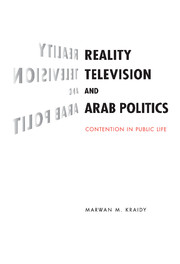Book contents
- Frontmatter
- Contents
- Acknowledgments
- Preface
- Introduction: Beyond al-Jazeera
- 1 Screens of Contention: The Battle for Arab Viewers
- 2 Voting Islam Off the Island? Big Brother in Bahrain
- 3 The Saudi-Lebanese Connection
- 4 Contesting Reality: Star Academy and Islamic Authenticity in Saudi Arabia
- 5 Gendering Reality: Kuwait in the Eye of the Storm
- 6 A Battle of Nations: Superstar and the Lebanon-Syria Media War
- 7 The “New Middle East”? Reality Television and the “Independence Intifada”
- Conclusion: Performing Politics, Taming Modernity
- List of Interviews
- Further Readings
- Bibliography
- Index
- Titles in the Series
2 - Voting Islam Off the Island? Big Brother in Bahrain
Published online by Cambridge University Press: 05 June 2012
- Frontmatter
- Contents
- Acknowledgments
- Preface
- Introduction: Beyond al-Jazeera
- 1 Screens of Contention: The Battle for Arab Viewers
- 2 Voting Islam Off the Island? Big Brother in Bahrain
- 3 The Saudi-Lebanese Connection
- 4 Contesting Reality: Star Academy and Islamic Authenticity in Saudi Arabia
- 5 Gendering Reality: Kuwait in the Eye of the Storm
- 6 A Battle of Nations: Superstar and the Lebanon-Syria Media War
- 7 The “New Middle East”? Reality Television and the “Independence Intifada”
- Conclusion: Performing Politics, Taming Modernity
- List of Interviews
- Further Readings
- Bibliography
- Index
- Titles in the Series
Summary
On March 1, 2004, one week after MBC launched al-Ra'is, the Arabic version of Big Brother, shot in the minuscule Persian Gulf island nation of Bahrain, a company spokesperson leaked to Agence France-Presse that “a decision to suspend the program was taken today.” The show appeared to have been doomed when a scarf covering the shoulder of a female Egyptian-Iraqi contestant fell and when, shortly thereafter, Hakim, a male Saudi contestant, kissed Kawthar, a female Tunisian participant, on the cheeks. On February 27, 2004, a few hundred people demonstrated against al-Ra'is in Manama, Bahrain's capital. This sequence of events led Arab and Western media to report that MBC canceled al-Ra'is after demonstrators objected to the show's foreign values, which they deemed offensive to Islam. As told by the press, the story fits a well-rehearsed archetype: Muslim clerics oppose popular culture that reflects Western values; in turn, “traditional” society bows to religious edicts. In such narratives, Islam is trumpeted, in Olivier Roy's words, as “a discrete entity, a coherent and closed set of beliefs, values and anthropological patterns” – an all-encompassing determinant of social relations.
This chapter advances a different perspective, avoiding ready-made formulae and relying instead on empirical research and careful examination of complicated institutional, national, and regional forces. It shows that religious determinism – analyzing events exclusively through the prism of “Islam” – obscures political agendas and economic interests.
- Type
- Chapter
- Information
- Reality Television and Arab PoliticsContention in Public Life, pp. 46 - 65Publisher: Cambridge University PressPrint publication year: 2009



